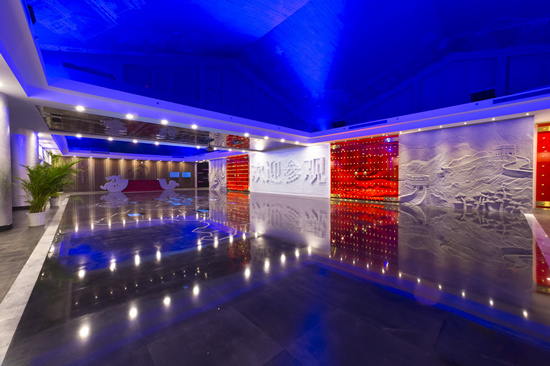Customers put Sanlitun back on the menu
Business returns to restaurant, bar and entertainment area
Alessia Chizzoniti, an Italian who founded a cultural center in Beijing, has lived in the Chinese capital for a decade.
Her favorite spot is a Mexican eatery in the city's Sanlitun restaurant, bar and entertainment area, where she can enjoy a perfect Friday night-food first, then drinking and making merry.
Before the novel coronavirus outbreak, she visited El Barrio often sometimes twice a week with family, friends and business partners.
Chizzoniti, who launched Blossom Montessori, a bilingual education and culture center for 6-to 12-year-olds in Beijing's Chaoyang district in 2018, remembers El Barrio being nearly empty in February. At the time, as the outbreak took hold, she was beginning to reduce her visits to restaurants.
After the winter, El Barrio reopened its terrace to drinkers this month, enabling Chizzoniti to meet friends there again.
"Even though I miss the disc jockey and the parties, I don't want the restaurant to rush into fully reopening," she said.
Sanlitun has been hit hard by the outbreak, but since Beijing lowered its public health emergency response level on April 30, the area has gradually been attracting customers back to shop, eat and drink. The measures taken to prevent the virus spreading have become a kind of "new normal" for all business.
Ma Zedan, head of Taikoo Li Sanlitun, the shopping and entertainment complex at the heart of the area, said the level of business now was about 70 percent of that at the same time last year. On May 1-the start of the five-day Labor Day holiday-some 60,000 people visited the area, with business levels reaching 90 percent compared with the same time last year.
"On the one hand, there were fewer tourists. On the other, most locals chose to stay in Beijing instead of traveling during the holiday," Ma said."But they are not spending as much time in Sanlitun as before the pandemic, and the nightlife has not yet returned."
He added that there would not be a wave of so-called retaliatory consumption, as many people expected, but more customers would soon be visiting the area again. As Taikoo Li Sanlitun is an outdoor mall, people feel safe wandering around.
Ma said that in the past three months, the complex has hired more security staff members for anti-pandemic procedures. There are more than 20 entry and exit points to Taikoo Li Sanlitun, and half of them have had to be closed, with temperature checks being carried out at the remainder.
To enter Nali Patio, where El Barrio is located, Chizzoniti has to register, show her health QR code and have her temperature tested.
"All the prevention procedures don't bother me, as they make me feel it is safe to eat," she said.
At Bottega, an Italian restaurant next to El Barrio, a note placed on every table offers advice in Chinese and English on how to avoid becoming infected with the virus.
Nana Shinohara, co-founder of the business, said the notes have replaced promotional information.
Business was quiet at Bottega during the winter, but customers returned in numbers during the Labor Day holiday.
"In February, there were almost no Chinese customers, only some foreigners, and because many eateries were not open then, I had the same clients coming to eat at the restaurant four times a week.
"It was also the first time I had walked through Sanlitun and seen nobody else."
In February, delivery orders at Bottega rose tenfold, but have gradually returned to the normal level. "At the time, we didn't even have enough boxes to package deliveries. We had to buy some from other restaurants, which had yet to reopen," Shinohara said.
In March, Chinese clients started to return, with their numbers rising in April. "We followed the 'no gatherings' rules strictly, and before May, we only allowed a maximum of 30 people to eat in our restaurant, which seats 90," Shinohara said.
She added that most of her clients are usually middle-aged people with families. But during the pandemic, the majority of them have been young diners, couples or friends.
"I have to thank Sanlitun, because everyone wants to come here for leisure. If it were not for the location, business would not have returned so soon," she said.
Shinohara operates another Bottega branch in Xinyuanli, an entertainment area next to the eastern section of the Third Ring Road. This business has lost more during the outbreak than the one in Sanlitun.
Empty neighborhood
Marcus Medina, chef and co-founder of Q Mex, said all four branches of his Mexican restaurant business in Beijing have remained open during the pandemic, with custom at the branch in Sanlitun returning to 80 percent of the normal level during recent weekends.
"The Sanlitun branch is the oldest and it's had a two-year head start on all the others, so it's going to be more popular," he said, adding that on the eve of Spring Festival, the restaurant was full of people celebrating, but next day, the whole neighborhood was empty.
Medina, who flew to Cambodia to buy 2,000 face masks for his employees, was quarantined at home for two weeks after returning to Beijing.
Demand for Q Mex's delivery service boomed in February, with Medina surprised by the popularity of canned sangria and margarita created specially during the pandemic.
Having fewer customers and being quarantined failed to prevent him keeping busy, and he and his team started to create a new vegan menu.
At the Topwin Center, across the street from Taikoo Li Sanlitun, Japanese restaurant Beyond Yakitori is offering half-price dishes and changing its sake menu each month to attract regular customers back. Some 80 percent of its business has returned.
Compared with their Western and Japanese counterparts, restaurants serving Chinese cuisine have lost more business during the past three months, as they are more suitable for family gatherings.
Jing Yaa Tang, a restaurant with one Michelin star, began deliveries of Peking duck in April, but is eyeing the return of dine-in customers.
Feiteng Xiaoyan, a new subsidiary of the Feiteng Yuxiang restaurant chain-known for its hot and spicy fish-opened in Taikoo Li Sanlitun in January, but did not have time to promote its business before the outbreak struck.
"The subsidiary is aimed at young people, and has quite a different interior design," manager Wang Zheng said."Preparations to open began last summer."
"Thanks to Taikoo Li reducing some of our rent during the pandemic, our new subsidiary could survive, and as more customers are coming to Sanlitun now, especially on weekends, business is getting better and better."
Ma, the Taikoo Li head, said that each month it contacts tenants to offer rental reductions to help during the pandemic.
"In February, the catering industry suffered the most, with only 10 to 20 percent of its normal business. Now, some luxury brands may face the problem of global supply shortages due to the pandemic. We will take these factors into consideration when helping them," he said.
Cinemas and gyms have yet to reopen, giving people less reason to visit Sanlitun.
Ma said sports brands have offered discounts to attract clients, and Taikoo Li has launched livestreaming sessions and short videos to keep in touch with customers.
At the Opposite House, an upscale hotel in the center of the area, local clients are being targeted.
General manager Mark Passmore said a fitness package has been launched, which includes facilities being placed in the hotel's rooms to enable clients to have their own "gyms".
Locals stay at the Opposite House, which hopefully over the next few months would see a gradual rise in the number of domestic clients, Passmore said.
At the Sanlitun branch of the PageOne bookstore, more themed displays of children's books were added recently and also some about Mother's Day.
Store manager Qin Haoxia said that as schools and kindergartens were closed, parents wanted to buy more books to read with their children.
"As we can't host events such as book clubs right now, we try to do livestreaming shows to interact with readers," she said.
Qin said that in February, fewer readers visited the store, but some of them bought more books than usual, adding, "They are buying a dozen books to read over the next one or two months."
In March, PageOne launched a delivery service in collaboration with Meituan Waimai, an online takeout food platform, and received more than 20 orders a month.
"This is convenient for our clients who live nearby to get our books, and we are also offering some discounts to attract more online orders," Qin said.
The store, which is gradually extending its closing time from 6 pm to 10 pm, has seen business return to 50 percent to 60 percent of the level this time last year.
Jetleg Books, a new bookstore, opened in Sanlitun in March, while both the Sanlian Taofen bookstore and the reading room next to it are reopening.
Qin welcomes more bookstores coming to the area, as they "add to the cultural atmosphere".
"Each store has its own specialty. We focus on original art books, while the Sanlian Taofen bookstore is more about social science," she said.
Challenge for bars
With stricter prevention rules in place than at other businesses, the area's bars face an additional challenge.
Song Peng, who opened Scandal bar three years ago, is struggling during the pandemic. He had to close in February, and now is only allowed to admit a maximum of 30 people.
"At restaurants, each table can cater to more than one group of customers on an evening. But at bars, a customer may order only one drink and stay all night, so it is harder for bars to recover," he said.
"The best season for us is from November to May, and it has almost passed. I don't know if the bar will get through the summer."
Some stores and restaurants in the area have closed permanently due to the pandemic, providing an opportunity for other brands to move in.
Bottega has already signed a lease with Taikoo Li to open a new restaurant in August.
Shinohara, the co-founder, said: "Many owners dropped their plans to open new restaurants this year. So did I initially, but I like the space we found in Taikoo Li, as it has a ceiling about 10 meters high. Our new restaurant will aim to attract young people."
Ma said:"The start of each year is always a time of change for brands. This year, because of the pandemic, construction and decoration work have had to be postponed, so the opening of some new stores has been delayed."
Some 10 international brands are planning to open their first stores in China in Sanlitun this year, Ma said, adding, "It shows that they are confident about their investment in the country, even after the pandemic."

 Responsibilities of the SOCAAC
Responsibilities of the SOCAAC Experiencing Beijing 2023
Experiencing Beijing 2023